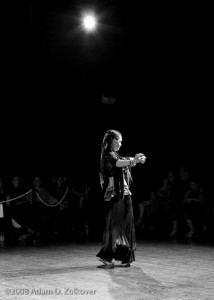 I am not a religious person. This is for many reasons, but one of those reasons is that religion is not more like dance. Allow me to elaborate.
I am not a religious person. This is for many reasons, but one of those reasons is that religion is not more like dance. Allow me to elaborate.
Dance is for everyone, but no one is forced to dance.
Dance can be done alone, with a partner, or in groups. Dance is at once intensely personal and easily social.
Dance is something that makes us grateful for our bodies, but in that moment of disembodied awareness (there is an “I” that is separate from my body but also at home in my body to be grateful for it), it does not alienate us from our bodies. Dance does not make us feel ashamed about our bodies; it makes us live more fully in our bodies, which includes embracing our age, our sexuality, the ways we can and cannot move, and our pasts. Dance does not judge us for what our bodies are or are not.
Dance has the potential to be profoundly spiritual, yet it does not require it. For some people, dance is a form of exercise, and that’s okay. For others, dance is the highest form of art and communion with the divine. That’s okay too. Most of us probably fall somewhere in the middle of the two extremes, which is fine.
Exploring multiple forms of dance has the potential to make you a better dancer, to make you more self-aware. Experimenting with multiple forms of dance puts you in different postures and moves your body in different ways; you learn to experience yourself differently. You learn how people in others cultures learn to hold and move their bodies. Moving like others gives you compassion for them, and appreciation for their lives.
At the same time, not every form of dance is right for everyone. I’ve been belly dancing almost half my life, which makes me pretty good at it. But put me in a ballet class, and I feel like a cow. That doesn’t mean that I loathe ballet, or think its practitioners are terrible people. It just means that I practice it rarely (though perhaps I should practice it more – we can learn a lot from the things we’re bad at and the things we dislike). My belly-dance-honed posture and arm gestures have helped me learn flamenco faster than I might otherwise, while my naturally low center of gravity has aided me in the West African dance classroom. Some dance forms are, for reasons easily understood or not, simply better for certain people than others.
Even hardcore dancers take breaks from dance. Sometimes your body requires it. Sometimes other parts of your life demand it. Stepping back from dance or ceasing to dance doesn’t make you a bad dancer; rather, it means that you’re human, and have healthily recognized that no one practice should dominate your life.
So long as you are dancing, there is no right or wrong way to dance. For people who choose to dance professionally or full-time, there are nuances of the “right” or “wrong” way to do a move that help them refine their practice, but aren’t necessarily relevant for people who dance simply for the joy of it. So long as they’re not harming others through their dance, rules are less important than consistency and engagement.
If you reread my words, replacing “dance” with “religion” (or its appropriate equivalent verb), hopefully you’ll grasp my meaning. If religion were more like dance – more egalitarian, less judgmental – maybe I would consider practicing it. If religion embraced variation and change, rather than demanding adherence to the teachings of a single leader or text, perhaps it wouldn’t alienate as many people who see that we live in a changing and diverse world and thus we need mutable and diverse strategies to cope and adapt.
Dance does not insist that you must worship it and it alone. Dance does not judge you. Dancers do not persecute non-dancers.
Most of the religious people I choose to hang out with? Are dancers (and often scholars and athletes too). I’m not saying every dancer is automatically awesome, but I think dancing can teach us something very valuable about appreciating diversity, because dance is inherently as diverse as humanity – our bodies make it so. When religion catches up in that regard, then I’ll be game to have a serious discussion about its role in my life. Until then, I’ll learn only as much as I need to survive in a world dominated by confusingly contradictory and hostile belief systems.
